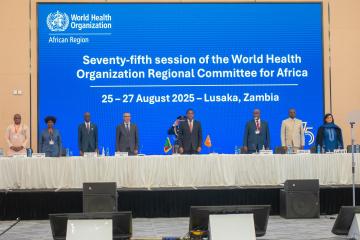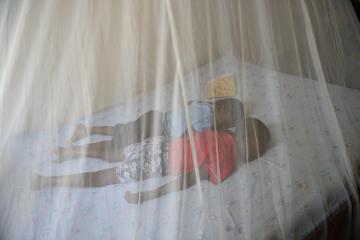Despite the availability of effective vaccines against common childhood infections a significant number of children under five years of age continue to die from communicable diseases. The causes of these deaths includes: viral, bacterial, parasitic, and vector-borne diseases.
Vaccines have proven to be the most cost effective public health tool in the fight against infectious diseases. Research and development of new vaccines has the potential to contribute to better immunization programmes and to reduce further childhood mortality in line with the Health related Millennium Development Goals (MDGs).
Improvements in scientific knowledge and development of new technologies have accelerated vaccine development and resulted in the testing of new vaccines against common infectious diseases. More clinical trials are increasingly being planned for Africa to evaluate efficacy and safety of candidate vaccines.
Contribution of Research and Development (R & D) of new vaccines to the Immunization and Vaccine Development Program
The role of R & D of new vaccines in supporting IVD program includes:
- Assisting countries to prioritize communicable. diseases so as to assist in priority-setting and resource allocation for vaccine research
- Building capacity for scientifically valid and ethically acceptable clinical trials of vaccines in Africa.
- Providing guidelines and standards for vaccine clinical trials in Africa.
- Sustaining and/or building partnerships for vaccine research and development in order to conduct vaccine clinical trials and accelerate the introduction of new vaccines in Africa.
Challenges
- Lack of government coordination: In a number of African countries vaccine research and development is not well coordinated.
- Lack of national committees: In many countries of the African Region, national ethics and scientific review committees as well as national regulatory authorities (NRAs) require strengthening.
- Inadequate funding for R & D: Vaccine clinical trials require substantial financial resources which is not readily available in many cases.
- Limited Research skills and facilities: Research requires pre-requisite skills, expertise and facilities that are often lacking in the Region.
Progress and Accomplishments
- Joint Review of the Phase III Malaria vaccine clinical trial protocol
- Conjugate meningococcal A vaccine trial
- Rotavirus vaccine clinical trials in five African countries
- Cholera and HPV vaccines clinical trials
- New tools have been made available to WHO/AFRO countries to enable them to further research in vaccine development efforts.
- National and institutional ethics committees as well as NRAs have been strengthened to ensure that vaccine research carried out in countries in the Region is done in accordance with internationally and regionally set standards.
- The establishment of the African Vaccine Regulators Forum (AVAREF) has facilitated the joint review, authorization and monitoring of vaccine clinical trials in Africa.
Our Goals
- To provide direction and technical assistance for vaccine R&D and the introduction of effective and safer vaccines within Africa. This goal is consistent with the WHO/AFRO strategies for achieving the health related MDGs.
- To sustain and/or build new partnerships in the furtherance of capacity building and conduct of vaccine clinical trials.
- To provide standards and guidelines for vaccine trials in Africa; and build capacity for scientifically valid and ethically acceptable clinical trials of vaccines in the Region.
Our Partners
R & D partners include national governments, the Global Alliance for Vaccines and Immunization (GAVI), European and Developing countries clinical trial partnership (EDCTP), Program for Appropriate technology and Health (PATH), Centers for Disease Control (CDC), Atlanta.
Contact Information
Dr. Bartholomew Akanmori
Regional Focal point for Vaccine Research and Development
Tel: + 47 241 39112
Fax: +47 241 39641
E-mail: akanmorib@afro.who.int






